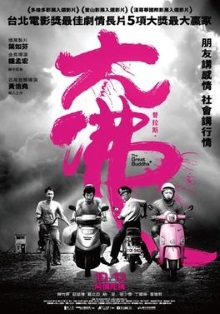
This is another Taiwanese film that is a recommendation from our cinephile and though it was directed by a new guy, Huang Hsin-yao, it’s visibly from the same team as the ones who made Godspeed. The addition to the plus symbol which forms part of the title seems eccentric but apparently is meant to represent that this film is an expansion of the director’s previous short film bearing the same title that was nominated for a Golden Horse Award.
Belly Button makes a miserable living at collecting recyclable materials and his modest circumstances force him to be humble in his everyday life. His best friend, Pickle, works as a security guard at a factory and whenever he visits at night to hang out, he is able to be brash and assertive. One evening when he discovers that the television set in the guardhouse is out of order, he persuades Pickle to get the dashcam footage from his boss’ car so they can watch it together. Most of the video content is predictably boring but the camera does capture sound from inside the car and the pair amuse themselves by playing voyeur and listening in on the many occasions when the boss has sex with various girls in the car. Eventually however they stumble upon a video that horrifies them. It shows the boss meeting with a middle-aged woman, who Belly Button had already noticed hanging out near the factory earlier, and then apparently murdering her. These events are also connected with the giant Buddha statue that the boss has been commissioned to make.
I chose to spoil the little twist there because it was pretty obvious to me which way the plot was going. The film makes a couple of interesting stylistic choices. One is that the director narrates portions of it with commentary about the details of the lives of the various characters that wouldn’t otherwise be conveyed onto the screen. Another is that it’s shot entirely in black and white with the exception of the dashcam footage which is shown in color. The latter decision has the effect of contrasting the mostly dreary and difficult lives led by the two friends and the other poor people they associate with to the glamorous lifestyle led by the boss with his peers. One rather incredible scene has the car driving into what seems to be the Taiwanese equivalent of a love hotel that I had no idea existed. The experience is setup like a drive-through so that the visitors never have to have face to face contact with anyone. The choice of including narration however feels like bad filmmaking, as if the director needs to hold the audience’s hand in order to persuade them that these little people are deserving of sympathy. It breaks both the sense of immersion and any tension from the murder that forms the core of the story.
Beyond the usual themes of how life is tough for underclass while the elite live it up, this film also aims some barbs at religion. One scene has the two friends visiting a temple after viewing the fateful video to ask for cleansing and advice. It turns out to be a shrine dedicated to Chiang Kai-shek and the resident medium offers nothing except for empty homilies. More broadly the entire film can be seen as a critique against the religious establishment which provides moral cover and respectability to rich businessmen in exchange for financial support. It’s particularly amusing how both the big boss bankrolling the Buddha statue and the representative from the temple liberally insert the phrase amituofo into every sentence just for the sake of appearances. I don’t find this critique to be particularly insightful or original but it is daring.
On the whole this goes for the film as a whole as well. It’s beautifully shot, it makes the right nods towards laudable aims and it has enough artistic merit to be notable. At the same time, it is neither all that good nor really entertaining. It might be most memorable for its car sex scene featuring a very loud girl. Somehow I don’t think this is what the director hoped for.
One thought on “The Great Buddha + (2017)”